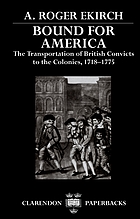
A penal colony or exile colony is a settlement used to exile prisoners and separate them from the general population by placing them in a remote location, often an island or distant colonial territory. Although the term can be used to refer to a correctional facility located in a remote location, it is more commonly used to refer to communities of prisoners overseen by wardens or governors having absolute authority.

Penal transportation was the relocation of convicted criminals, or other persons regarded as undesirable, to a distant place, often a colony, for a specified term; later, specifically established penal colonies became their destination. While the prisoners may have been released once the sentences were served, they generally did not have the resources to return home.

Indentured servitude is a form of labor in which a person is contracted to work without salary for a specific number of years. The contract, called an "indenture", may be entered voluntarily for purported eventual compensation or debt repayment, or imposed involuntarily as a judicial punishment. Many came with forged or no contract they ever saw.

The Piracy Act 1717, sometimes called the Transportation Act 1717, was an Act of the Parliament of Great Britain that established a regulated, bonded system to transport criminals to colonies in North America for indentured service, as a punishment for those convicted or attainted in Great Britain, excluding Scotland. The Act established a seven-year transportation sentence as a punishment for people convicted of lesser felonies, and a fourteen-year sentence for more serious crimes, in lieu of capital punishment. Completion of the sentence had the effect of a pardon; the punishment for returning before completion was death. It is commonly accepted that 30,000 convicts may have been transported to the British American colonies, with some estimates going as high as 50,000.

The Boston News-Letter, first published on April 24, 1704, is regarded as the first continuously published newspaper in the colony of Massachusetts. It was heavily subsidized by the British government, with a limited circulation. All copies were approved by the Royal governor before publication. The colonies’ first newspaper was Publick Occurrences Both Forreign and Domestick, which published its first and only issue on September 25, 1690. The Weekly Jamaica Courant followed in Kingston, Jamaica from 1718. In 1726 the Boston Gazette began publishing with Bartholomew Green, Jr., as printer.

Chaos: Making a New Science is a debut non-fiction book by James Gleick that initially introduced the principles and early development of the chaos theory to the public. It was a finalist for the National Book Award and the Pulitzer Prize in 1987, and was shortlisted for the Science Book Prize in 1989. The book was published on October 29, 1987 by Viking Books.
George Woodman Hilton was a United States historian and economist, who specialized in social history, transportation economics, regulation by commission, the history of economic thought and labor history.

Ames' Almanack (almanac) was the first almanac printed in the British North American colonies. While Benjamin Franklin's Poor Richard's Almanack is more widely known, the Ames' Almanack had a much larger readership. Franklin's publication had a circulation of 10,000 copies compared to 60,000 for the Ames' Almanack.
Gloria Lund Main is an American economic historian who is a professor emeritus of history at University of Colorado Boulder. She authored two books about the Thirteen Colonies.
Events from the year 1798 in the United States.

This is a list of books in the English language which deal with Jersey and its geography, history, inhabitants, culture, biota, etc.
Thyra Ingrid Hildegard Detter de Frankopan is a Swedish scholar of international law, Lindhagen Professor Emerita at Stockholm University, a practising barrister, and the author of multiple books.
Jonathan Forward (1680–1760) was a London merchant primarily responsible for convict transportation to the American colonies from 1718 to 1739. In accordance with the Transportation Act 1717, Forward was contracted to transport felons from Newgate Prison and from numerous home counties.

Indentured servitude in British America was the prominent system of labor in the British American colonies until it was eventually supplanted by slavery. During its time, the system was so prominent that more than half of all immigrants to British colonies south of New England were white servants, and that nearly half of total white immigration to the Thirteen Colonies came under indenture. By the beginning of the American Revolutionary War in 1775, only 2 to 3 percent of the colonial labor force was composed of indentured servants.

Arthur Roger Ekirch is University Distinguished Professor of history at Virginia Tech in the United States. He was a Guggenheim fellow in 1998.
Thomas Barrett was a convict transported on the First Fleet to the colony of New South Wales. He created Australia's first colonial art work, the Charlotte Medal, which depicts the arrival of Charlotte at Botany Bay. He was also the first person to be executed in the new colony.
This is a select bibliography of English language books and journal articles about the post-Stalinist era of Soviet history. A brief selection of English translations of primary sources is included. The sections "General surveys" and "Biographies" contain books; other sections contain both books and journal articles. Book entries have references to journal articles and reviews about them when helpful. Additional bibliographies can be found in many of the book-length works listed below; see Further reading for several book and chapter-length bibliographies. The External links section contains entries for publicly available select bibliographies from universities.
The following is a list of works about the spouses of presidents of the United States. While this list is mainly about presidential spouses, administrations with a bachelor or widowed president have a section on the individual that filled the role of First Lady. The list includes books and journal articles written in English after c. 1900 as well as primary sources written by the individual themselves.
Edith Belle Gelles is an American author and historian. She grew up in Lake Placid, New York, and attended Cornell University, Yale University, and the University of California, Irvine. She is currently a Senior Scholar at the Clayman Institute for Gender Research at Stanford University where she has been a faculty member since 1983. Her scholarship is primarily in the area of early American history, concentrating on biography and women. She is known for her scholarship and writing about Abigail Adams and her husband John.
Donald R. Hickey is an American academic who is professor of history at Wayne State College, author and lecturer on early American history, mostly involving the War of 1812. He has been with Wayne State since 1978 while simultaneously acting as visiting professor at the Army Staff College (1991–1992), the Naval War College (1995–1996), and The Citadel (2013). Hickey has written many articles for numerous historical journals and magazines, and has served on the editorial and advisory boards of several. During his academic career, Hickey has earned a number of awards for his scholarship and literary efforts.









